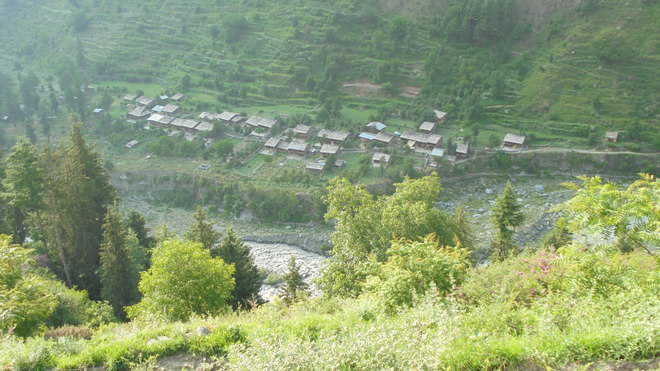In Kangra’s remotest village
RK Prashar
It has been an especially tough summer for the people living in Bara Bhangal. The season is almost over but they have remained cut off from the outside world, thanks to a bridge across rivulet Kalihani that was completely damaged by an avalanche in winters.
Trekkers like me reach Bara Bhangal after crossing the Thamsar and Maraal passes. It is located at the foot of soaring mountains and faces the threat of swirling waters of Ravi. It comprises two pristine hamlets of about 200 households and 600 people. Perched at an altitude of about 3,000 metre in Baijnath sub-division of Kangra district, it is more tribal than any other tribal area in the state if the living conditions of the area are any indication. Menacingly landlocked, it remains snowbound for six months disrupting normal life.
Let us take stock of the basic facilities first. It has a primary school, a high school, an ayurvedic dispensary, a forest guard office, a veterinary pharmacy and a forest rest house. But these facilities end with the list itself. Only three posts of teachers have been filled in the high school. The posts of science teacher and headmaster are lying vacant. The ayurvedic dispensary has been without a doctor for the past three years and is looked after by a peon. There is no forest guard and the veterinary pharmacist sits at Bir near Baijnath. The forest rest house is looked after by a local.
The village’s young pradhan, Rajni Kumari, knows the enormity of the task at hand. She says her top priority is to seek Schedule Tribe (ST) status for the residents. The matter is being placed in the upcoming general house meeting (aam jalash) of the panchayat where members will be urged to adopt a resolution seeking the same.
The residents belong to Gaddi community, which enjoys ST status both in Bharmour tribal sub-division of Chamba district and non-tribal areas in Shahpur, Palampur, Baijnath, Dharamsala, Chowari, et al. Rajni Kumari says they are being meted out step-motherly treatment. Even though the locals have raised the demand on several occasions, the ST status to them has never been an election issue. They even raised this demand with former Chief Minister Virbhadra Singh during his visit to Bara Bhangal a few years ago.
In the absence of any benefits, the economy of the area is largely dependent upon sheep rearing, manual labour and cultivation of rajmah or kidney beans, which is a major cash crop of Bara Bhangal. However, in the absence of the bridge, hundreds of quintals of the crop have been lying with the growers.
There is no telecom network and no power in the village. To provide electricity, an attempt was made by setting up a 2X20 KW power house under the micro hydel power project scheme. However, it has gone phut in the past eight years. Rajni Kumari says there is a solar power proposal for the area but no tender has yet been invited. She, however, expresses unhappiness about the idea and says batteries for solar lights frequently develop problems and may not be a successful effort.
She says summer and monsoon are the only time when development works involving roads and drains can be undertaken, but the broken bridge has stalled all of it.
So, how do the villagers take to all this lack of development and infrastructure? Well, they say they are happy. Their annual carnival is celebration of the Independence Day in the school ground where all villagers, including the shepherds staying around, converge and salute the Tricolour. When I visited last month, the preparations had begun and the vendors had started pitching their stalls near the school. Simple joys of life.
‘Shiva, our saviour’
Ask Kapoori Devi, an elderly woman, as to how they manage without medicines and doctor during peak winter, and she says: “We don’t bother about the expiry date of medicines. We take them when needed. Our saviour is Lord Shiva.” Interestingly, it is common for the villagers to cadge any strangers (tourists and trekkers) passing through their village for medicines. And what’s done in extreme health conditions like delivery of women? “Our midwives are more knowledgeable and trustworthy than doctors,” Kapoori Devi rather proudly declares.









